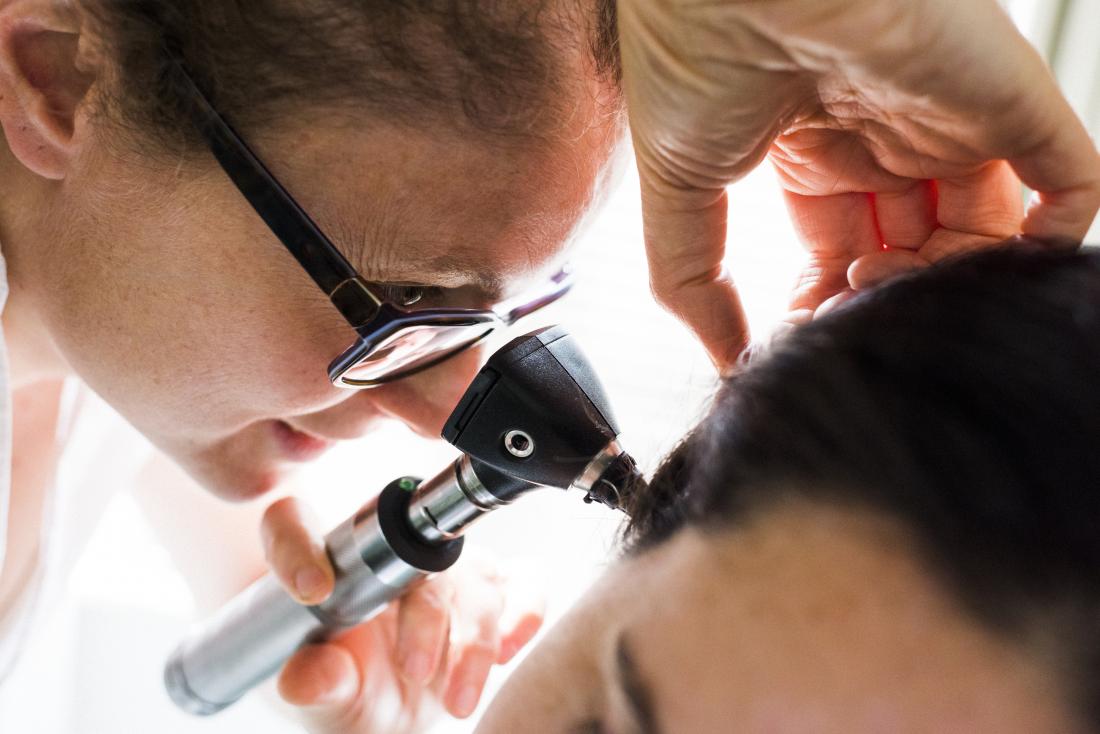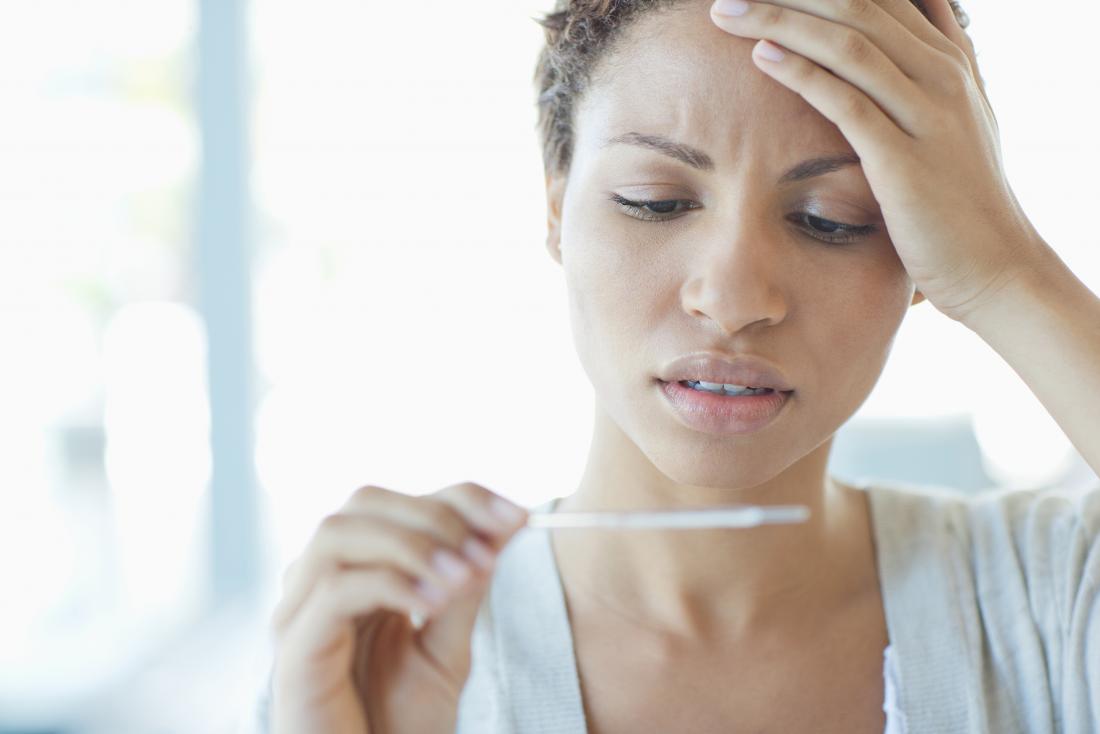Taking Claritin for Fluid in My Ears and Noise Got Better and Now Loud Again
There are many different causes of ear drainage. The most common type of drainage from the ear is earwax, which keeps the ear clean and healthy.
Other types of drainage and discharge include claret, clear fluid, and pus. These may signal a ruptured eardrum or ear infection.
Anyone who notices ear belch later on an injury to the head should seek medical attention straight away.
In this commodity, we expect at the possible causes of ear drainage every bit well equally treatment options and when to see a doctor.

Discharge from the ear can be a symptom of an infection.
Types and causes of ear drainage include:
Earwax
Earwax is normal drainage from the ear, and it can be white, yellow, or brown. The ears produce earwax to keep the ear clean and salubrious and to protect it from infection.
If earwax mixes with h2o, for instance, when someone bathes or swims, it tin can expect like runny discharge.
Articulate fluid
Clear fluid draining from the ear may be water, which can collect in the ear afterward swimming or bathing.
People can gently dry their ears after getting wet by holding a hair dryer on low heat abroad from their ear or past using a towel. Taking fourth dimension to dry out the ears can help preclude an infection called swimmer'southward ear, in which h2o becomes trapped in the ear.
Doctors sometimes place an ear tube in the ears of people who get frequent ear infections. The ear tube provides an opening into the centre ear, which may allow a small amount of articulate fluid to drain from the ear.
People should contact their doctor if whatever clear fluid drainage continues for more than 24 hours.
If a person notices articulate fluid from their ears after an injury to the head, they should seek immediate medical attending.
Blood
A minor injury or scratch in the ear canal can sometimes cause a small corporeality of claret to exit the ear.
If a person has a ruptured eardrum, they may discover claret, pus, or articulate fluid draining from the ear. The eardrum sits between the ear canal and the middle ear, and it can rupture if something creates a small pigsty in it.
The eardrum can rupture if:
- an ear infection puts force per unit area on the ear
- a loud noise happens very close to the ear
- a person inserts something also far into the ear
- someone experiences a sudden modify in air pressure level
- an injury occurs, such as a hit to the ear
A ruptured eardrum can cause the post-obit symptoms:
- ear hurting, then sudden relief
- ringing in the ear
- loss of hearing in the affected ear
If people discover any bleeding from the ear due to a head injury, they should seek immediate medical assistance.
Pus or cloudy fluid
Pus or cloudy fluid coming from the ear can be a sign of an ear infection in the ear canal or middle ear. The ear canal is the tube that joins the outer ear to the heart ear.
An infection of the middle ear, which doctors may refer to every bit otitis media, can cause fluid belch from the ear. Ear infections tin can crusade the eardrum to rupture in roughly x percent of cases. A ruptured eardrum can as well crusade drainage from the ear.
Ear infections can happen due to a cold, influenza, or injury to the ear. Some people are more prone than others to frequent ear infections. If people have an ear infection, they may also accept the following symptoms:
- an earache
- fever
- nausea

A medico volition utilize an otoscope during an ear examination.
A doctor will utilise an otoscope, which is a lighted microscope, to examine the ear and try to identify the underlying cause of the drainage.
They may also utilize a pneumatic otoscope that produces a puff of air to show how the eardrum moves in response to pressure. Doing this can prove whether there is a buildup of fluid behind the eardrum.
A test chosen tympanometry can assistance doctors examine the wellness of the middle ear. To do this test, a dr. will insert a probe into the ear and evaluate how the centre ear responds to different pressure levels.
During an ear examination, doctors may also comport out a hearing test or use a tuning fork to examination hearing levels.
Doctors will often prescribe antibiotics for some types of infection, which people can take either by rima oris or as ear drops depending on the location of the infection in the ear.
To help ease earache, people tin use a warm compress on their ear or accept over-the-counter hurting relievers, such as ibuprofen.
A ruptured eardrum will ofttimes heal without treatment inside a few weeks to two months. People can help the healing process and preclude infections by keeping their ear dry out and protecting it from loud noises and physical knocks.
If an eardrum does non heal by itself, surgery may exist necessary to patch new peel over the hole.
A doctor may prescribe antibiotics to care for ear fluid. The combination of a decongestant and an antihistamine tin can help reduce congestion.
If this treatment is not constructive, the doctor can place an ear tube through the centre ear to allow fluids to bleed as usual.
People can help prevent weather that cause ear drainage by taking steps to care for their ears, such as:
- using earplugs in the ear when swimming to assist keep water out and foreclose infection
- blowing the nose gently, non forcefully
- carefully drying the outside of the ears after getting them moisture
- avoiding inserting any objects into the ear

If a person has a fever along with ear drainage, they may wish to consult their doctor.
People should run across their medico if they experience any of the following:
- blood, articulate fluid, or pus leaking from the ear
- ringing or loss of hearing in the ear
- symptoms of a ruptured eardrum that persist for longer than 2 months
- severe pain in the ear
- a high fever
- swelling and inflammation behind the ear
If people detect whatsoever drainage from the ear after a head injury, they should seek medical help immediately.
Ear drainage can include:
- earwax
- blood
- pus
- cloudy fluid
- articulate fluid
Ear drainage can occur for several reasons, including an ear infection, a ruptured eardrum, or an ear tube that causes fluid to drain.
Ear discharge can sometimes be a sign of something more serious, peculiarly if it occurs subsequently a recent caput injury. If people notice any ear drainage after a caput injury, they should seek firsthand medical help.
Read the article in Spanish.
Source: https://www.medicalnewstoday.com/articles/324651
0 Response to "Taking Claritin for Fluid in My Ears and Noise Got Better and Now Loud Again"
Post a Comment